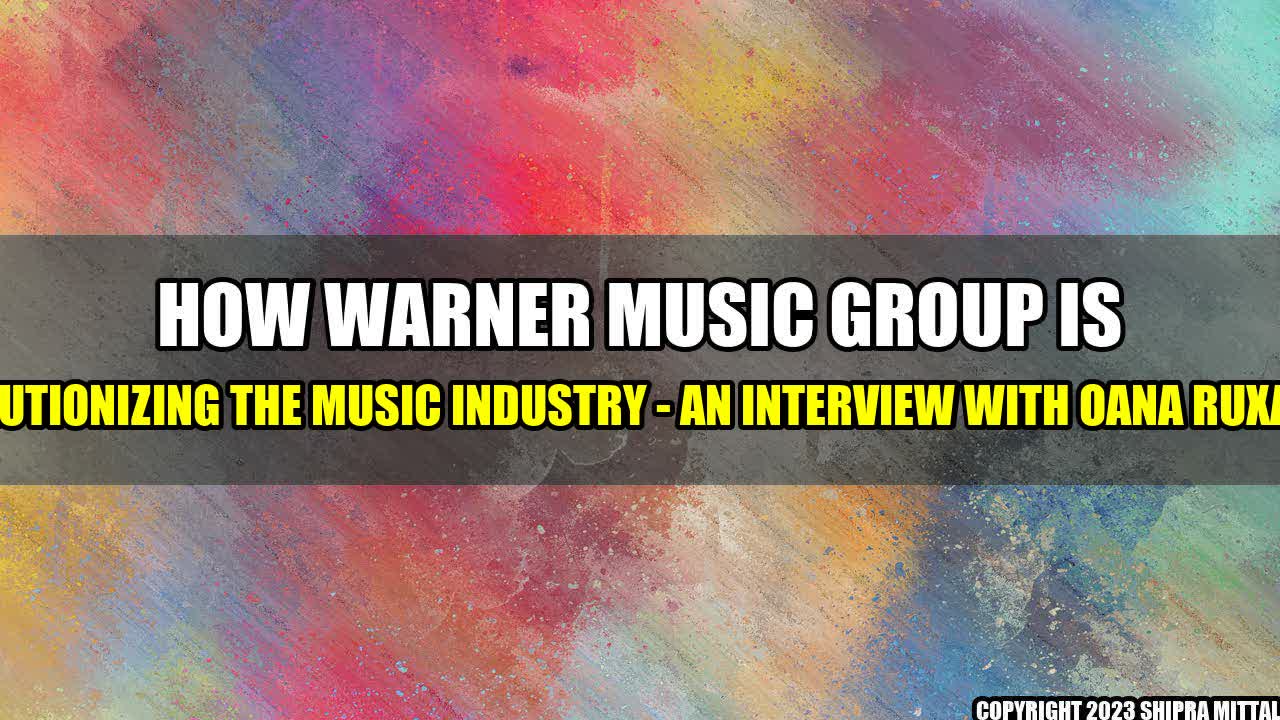
Oana Ruxandra is the Executive Vice President of Business Development and Chief Digital Officer at Warner Music Group, one of the world's leading music companies. With over 20 years of experience in the digital media industry, Oana is responsible for driving digital innovation and growth strategies across Warner Music Group's worldwide operations. In this interview, we talk to Oana about Warner Music Group's digital transformation journey and the impact it is having on the music industry.
When we asked Oana about how the music industry is changing, she shared with us a fascinating story. "When I started my career in the music industry, there were barely any digital services available. Music was mainly sold on physical formats like CDs and vinyl. However, in the early 2000s, Napster came onto the scene, and everything changed."
Napster was a peer-to-peer file sharing service that allowed users to share music files for free. This disrupted the traditional music business model, as people no longer had to buy physical copies of music. Oana explained how this sparked the start of the digital transformation in the music industry. "The music industry had to reinvent itself in the digital age, finding new ways to monetize music consumption. Companies like Warner Music Group had to adapt quickly to stay relevant."
Warner Music Group has been at the forefront of the digital transformation in the music industry. They have been quick to embrace new technologies like streaming services, which have become a major source of revenue for the music industry. "Streaming services like Spotify, Apple Music and Deezer have become an integral part of how people consume music today," says Oana. "Warner Music Group has been working with these services to ensure that our artists' music is available to fans globally."
Warner Music Group has also been investing in new technologies like artificial intelligence to help identify emerging artists, as well as blockchain to ensure the transparent and secure distribution of music royalties. "We are constantly exploring new technologies that can help us to create new revenue streams and improve the music industry for everyone," says Oana.
One example of how Warner Music Group has successfully adapted to the digital age is through their partnership with Tencent Music Entertainment (TME) in China. "TME is the largest music-streaming service in China, with over 700 million active users," explains Oana. "Through our partnership with TME, we have been able to introduce our artists to new audiences and grow our presence in the Chinese market."
Another example is Warner Music Group's partnership with Magic Leap, a technology company that specializes in augmented reality. "Through this partnership, we are exploring new ways to enhance the music experience using augmented reality technology," says Oana. "Imagine being able to see your favorite artist perform in your living room using AR glasses. That's the kind of innovation we're working on."
While the digital transformation has brought many benefits to the music industry, there are also some challenges. One of the biggest challenges is the value gap, where platforms like YouTube are able to offer music for free without paying fair royalties to the artists. "This is something that needs to be addressed," says Oana. "We need to ensure that artists are fairly compensated for their work, and that the music industry as a whole is sustainable in the long term."
Another challenge is piracy, which is still a major issue in many parts of the world. "Piracy not only hurts the artists and the music industry, but also the fans who are not getting the high-quality music that they deserve," says Oana. "We need to work together to fight piracy and ensure that music is accessible to everyone, but also that artists are paid for their work."
Warner Music Group is leading the charge in the digital transformation of the music industry, embracing new technologies and partnerships to drive growth and innovation. From streaming services to artificial intelligence and blockchain, the company is constantly exploring new ways to create value for artists and fans alike. However, there are also challenges, such as the value gap and piracy, that need to be addressed to ensure a sustainable future for the music industry.
#WarnerMusicGroup #musicindustry #OanaRuxandra #digitaltransformation #streamingservices #artificialintelligence #blockchain #TencentMusicEntertainment #MagicLeap #valuegap #piracy
Music Industry
Akash Mittal
Akash Mittal Tech Article
Share on Twitter Share on LinkedIn